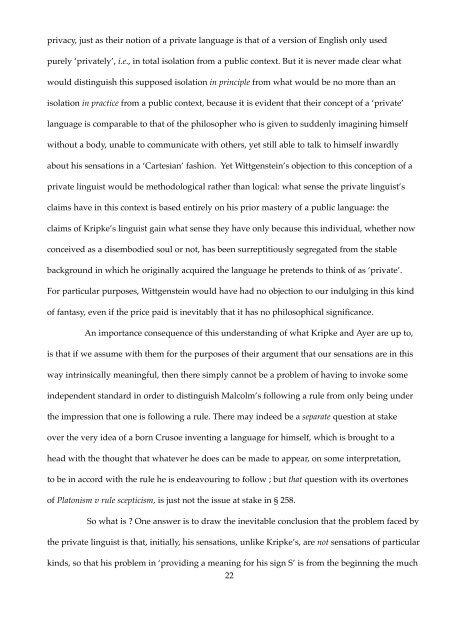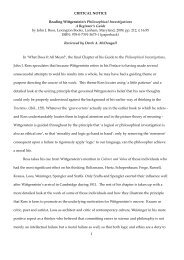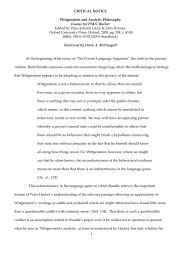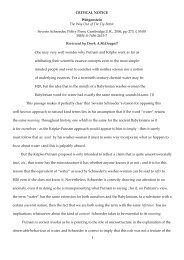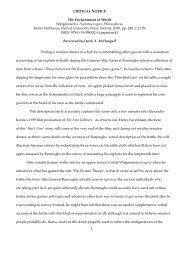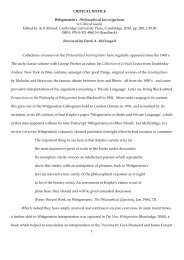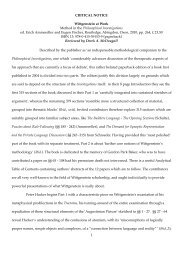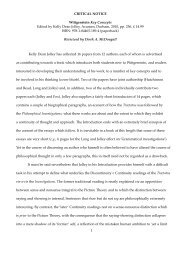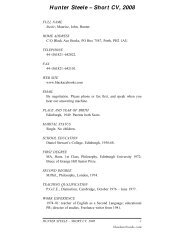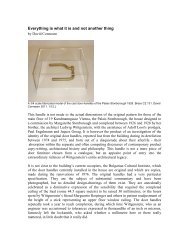The Evolution of the Private Language Argument Aldershot
The Evolution of the Private Language Argument Aldershot
The Evolution of the Private Language Argument Aldershot
You also want an ePaper? Increase the reach of your titles
YUMPU automatically turns print PDFs into web optimized ePapers that Google loves.
privacy, just as <strong>the</strong>ir notion <strong>of</strong> a private language is that <strong>of</strong> a version <strong>of</strong> English only usedpurely ‘privately’, i.e., in total isolation from a public context. But it is never made clear whatwould distinguish this supposed isolation in principle from what would be no more than anisolation in practice from a public context, because it is evident that <strong>the</strong>ir concept <strong>of</strong> a ‘private’language is comparable to that <strong>of</strong> <strong>the</strong> philosopher who is given to suddenly imagining himselfwithout a body, unable to communicate with o<strong>the</strong>rs, yet still able to talk to himself inwardlyabout his sensations in a ‘Cartesian’ fashion. Yet Wittgenstein’s objection to this conception <strong>of</strong> aprivate linguist would be methodological ra<strong>the</strong>r than logical: what sense <strong>the</strong> private linguist’sclaims have in this context is based entirely on his prior mastery <strong>of</strong> a public language: <strong>the</strong>claims <strong>of</strong> Kripke’s linguist gain what sense <strong>the</strong>y have only because this individual, whe<strong>the</strong>r nowconceived as a disembodied soul or not, has been surreptitiously segregated from <strong>the</strong> stablebackground in which he originally acquired <strong>the</strong> language he pretends to think <strong>of</strong> as ‘private’.For particular purposes, Wittgenstein would have had no objection to our indulging in this kind<strong>of</strong> fantasy, even if <strong>the</strong> price paid is inevitably that it has no philosophical significance.An importance consequence <strong>of</strong> this understanding <strong>of</strong> what Kripke and Ayer are up to,is that if we assume with <strong>the</strong>m for <strong>the</strong> purposes <strong>of</strong> <strong>the</strong>ir argument that our sensations are in thisway intrinsically meaningful, <strong>the</strong>n <strong>the</strong>re simply cannot be a problem <strong>of</strong> having to invoke someindependent standard in order to distinguish Malcolm’s following a rule from only being under<strong>the</strong> impression that one is following a rule. <strong>The</strong>re may indeed be a separate question at stakeover <strong>the</strong> very idea <strong>of</strong> a born Crusoe inventing a language for himself, which is brought to ahead with <strong>the</strong> thought that whatever he does can be made to appear, on some interpretation,to be in accord with <strong>the</strong> rule he is endeavouring to follow ; but that question with its overtones<strong>of</strong> Platonism v rule scepticism, is just not <strong>the</strong> issue at stake in § 258.So what is ? One answer is to draw <strong>the</strong> inevitable conclusion that <strong>the</strong> problem faced by<strong>the</strong> private linguist is that, initially, his sensations, unlike Kripke’s, are not sensations <strong>of</strong> particularkinds, so that his problem in ‘providing a meaning for his sign S’ is from <strong>the</strong> beginning <strong>the</strong> much22


